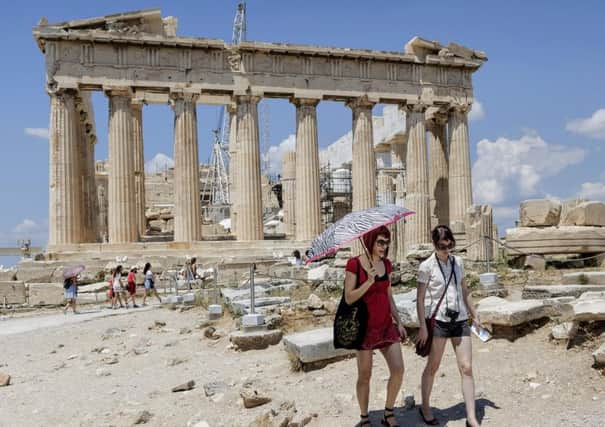PM urges Greeks to defy creditors


With his country on the brink of a potentially catastrophic financial collapse, Mr Tsipras appeared on national television to insist that the international creditors must respect the democratically-expressed will of the Greek people.
“I expect them to respect this democratic process, not to kill democracy in its birthplace,” he declared.
Advertisement
Hide AdAdvertisement
Hide AdHis defiance was sharply at odds with warnings by a series of European leaders that a No vote would see Greece heading out of the euro and possibly out of the European Union altogether.
The country’s current bailout expires today and without access to additional funds the radical left Syriza government will unable to make a 1.6 billion euro payment to the International Monetary Fund (IMF), becoming the first developed country to miss such a commitment.
While credit ratings agencies said that it would not immediately trigger a default rating, it will mean Athens cannot get any further funding from the world financial body until it has cleared the arrears.
The government has already been forced to order a week-long closure of the banks after the European Central Bank cut off support, restricting Greeks to withdrawals of just 60 euros a day from cash machines.
Advertisement
Hide AdAdvertisement
Hide AdOn another day of high-stakes brinksmanship, Mr Tsipras insisted that he would not bow to pressure from Greece’s creditors in the IMF and the eurozone.
“I do believe that we have to keep calm to deal with any blackmail and any threats,” he said.
But European Council president Donald Tusk became the latest senior figure to warn Greeks that a No vote in the referendum would not give their leaders the leverage to get a better deal.
“One thing should be very clear: if someone says that the government will have a stronger negotiating position with the No vote, it is simply not true,” he said.
Advertisement
Hide AdAdvertisement
Hide Ad“I’m afraid that which such a result of referendum, there will be even less space for negotiation.”
British holidaymakers heading for Greece were warned by the Foreign Office to take enough euros in cash to cover their spending needs as well as any possible emergencies.
Although restrictions on bank withdrawals do not apply to accounts held outside Greece there are fears that cash machines will simply run out and that credit and debit cards may no longer be accepted.
In the Commons yesterday, Chancellor George Osborne said British pensioners living in Greece would continue to receive payments from the Department of Work and Pensions - although those with Greek bank accounts would be offered advice on how to switch.
Advertisement
Hide AdAdvertisement
Hide AdWhile the UK is not part of the eurozone and had not been directly involved in negotiations, he warned that the Greek crisis remained “one of the biggest external risks to the British economy”.
“I don’t think anyone should underestimate the impact a Greek exit from the euro would have on the European economy and the knock-on effects on us,” he said.
“The eurozone authorities have made clear that they stand ready to do whatever is necessary to ensure financial stability of the euro area and we welcome that commitment to the currency.
“Equally the British government and the Bank of England stand ready to ensure our financial stability in the UK.”